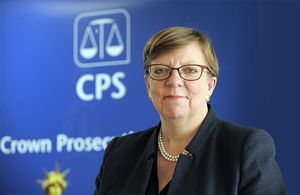Alison Saunders
(lawyer) | ||||||||||||||||
|---|---|---|---|---|---|---|---|---|---|---|---|---|---|---|---|---|
 | ||||||||||||||||
| Born | 1961-02-14 Aberdeen, Scotland | |||||||||||||||
| Nationality | British | |||||||||||||||
| Citizenship | United Kingdom | |||||||||||||||
| Alma mater | University of Leeds | |||||||||||||||
| Interests | Greville Janner | |||||||||||||||
Despite the collapse of an unprecedented number of abuse cases during her tenure as Director of Public Prosecutions, she still insisted she had done a good job. Let Greville Janner go.
| ||||||||||||||||
Alison Saunders is a former Director of Public Prosecutions whose tenure was marked by a number of trends, including the collapse of some rape trials after the prosecution failed to disclose evidence.[1] That led to a review of every rape and serious sexual assault case in the country. In January 2018, the BBC reported that the number of prosecutions in England and Wales that had collapsed due to a failure by police or prosecutors to disclose evidence had jumped 70 per cent, from 537 in 2014/15 to 917 in 2016/17.[citation needed]
Saunders also oversaw - failed or closed down - prosecutions of journalists and historic child abuse cases. Despite the collapse of an unprecedented number of abuse cases during her tenure as Director of Public Prosecutions, she still insisted she had done a good job. [2]
Contents
Policies
Alison Saunders became the first DPP to be overruled on a "victim right to review" when she decided it was not in the public interest for Lord Janner, the late Labour peer, to stand trial for alleged child sexual abuse, despite his meeting the evidential test for prosecution, because of his dementia. An independent QC found otherwise.[3]
She also dropped charges against nine journalists as part of the Operation Elveden case, a British police investigation into allegations of inappropriate payments to police officers and other public officials.[4]
Non-prosecution of Conservative MPs
In May 2017, Alison Saunders announced that no criminal charges would be brought against more than 20 Conservative MPs over the national party’s failure to accurately declare campaign spending on a battlebus tour at the 2015 General Election.
The Crown Prosecution Service said their constituency spending declarations “may have been inaccurate” but concluded there was insufficient evidence to prove dishonesty or bring a criminal case against the MPs and their agents.
At issue was whether the costs of a Conservative campaign battlebus should have been accounted for by local campaigns where the legal spending limits are tighter at between about £11,000 and £16,000, depending on the size of the constituency
Nick Vamos, the CPS head of special crime, said it was not in the public interest to bring charges. "By omitting any battlebus costs, the returns may have been inaccurate," he said. “However, it is clear agents were told by Conservative Party headquarters that the costs were part of the national campaign and it would not be possible to prove any agent acted knowingly or dishonestly,” he said.[5]
Promotion of secret trials
- Full article: Secret trial
- Full article: Secret trial
As Director of Public Prosecutions, Alison Saunders asked the Foreign and Commonwealth Office to intervene and seek a secret trial (a "closed material procedure") in the case of Abdel Hakim Belhaj and Fatima Boudchar.[6]
References
- ↑ https://www.telegraph.co.uk/women/politics/alison-saunders-must-stand-sacked/
- ↑ https://www.dailymail.co.uk/news/article-5568129/Under-fire-CPS-boss-Alison-Saunders-NOT-contract-renewed.html
- ↑ "Alison Saunders to step down as head of Crown Prosecution Service"
- ↑ http://content.met.police.uk/News/Statement-from-Commissioner/1260269177528/1257246741786
- ↑ "Tory election spending claims: 12 police forces pass files to CPS"
- ↑ "Libya rendition case against ex-MI6 officer may be held partly in secret"